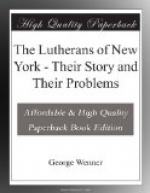Weygand died in 1770. He was succeeded by Hausihl (or Houseal, as he spelled his name in later years), a native of Heilbronn, who had served congregations in Maryland and in eastern Pennsylvania. Tradition reports that he was a brilliant preacher of distinguished appearance and of courtly manners. He succeeded in maintaining a large congregation.
But a serious change was going on in the church in the matter of language. In spite of the secession in 1750 other Germans kept coming into the Broadway church to such an extent that they outnumbered the Dutch eight to one, and finally the use of the Dutch language in the Lutheran Church of New York came to an end. Houseal had the distinction of conducting the obsequies at the preparatory service on Saturday, November 30, 1771, and at the administration of the Lord’s Supper on the following day.
But the death of the Dutch language by no means put an end to the language difficulties of our Lutheran ancestors. In the midst of the original contestants a new set of combatants had sprung up in the persons of the children of both parties. These spoke neither Dutch nor German. They understood English only and demanded larger consideration of their needs.
Events, however, were impending which soon gave the people something else to think about and caused a postponement of actual hostilities for another generation.
The church on Broadway was destroyed by fire in 1776, and was never rebuilt. The congregation worshipped for a time in the Scotch Presbyterian Church on Cedar Street.
The American Revolution broke out. On political questions our ancestors differed almost as widely as do their successors on synodical questions. Some of them were for George the Third, others were for George Washington. In this respect, however, they were not unlike other inhabitants of New York.
Frederick Muehlenberg, the pastor of the Swamp Church, was an ardent patriot. At the beginning of the war, as we have seen, he fled to Pennsylvania.
During the war the services were conducted by the chaplains of the Hessian troops. The Hessians were good church-goers and also generous contributors, so that the financial condition of the congregation at this time was greatly improved.
Houseal, the pastor of Trinity Church, was a tory, and when in 1783 the American troops marched into New York, he with a goodly number of his adherents removed to Nova Scotia and founded a Lutheran church in Halifax.
Both churches were now without pastors. Tribulation must have softened the spirits of the two contending congregations, for when Dr. Johann Christoph Kunze came to this city from Philadelphia in 1784, he became pastor of the reunited congregations, worshipping in the Swamp Church.
[illustration: “Frederick Augustus Conrad Muehlenberg; Pastor of the Old Swamp Church; subsequently member of the Continental Congress; Speaker of the Assembly of Pennsylvania; President of the Convention which in 1787 ratified the Constitution of the United States; Speaker of the first Congress of the United States of America.”]




